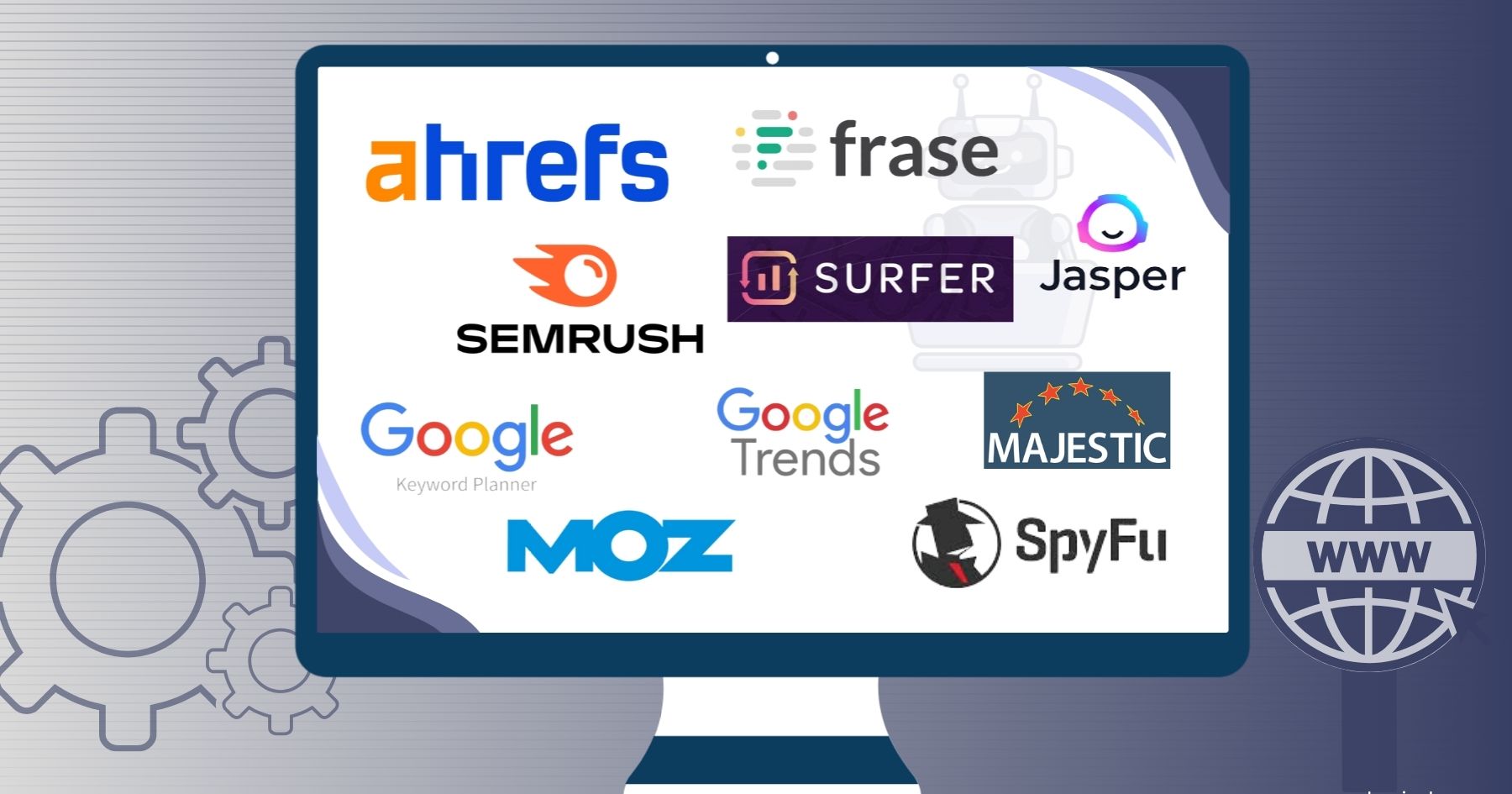
Last Updated August 14, 2024
Boost Your Rankings with These Top Content Optimization Tools
Optimising your website’s content is about crafting words that attract search engines and keep readers engaged. It’s a balancing act, but understanding the basics is key.
This guide is here to help you navigate the complex world of SEO. We’ll explore essential content optimisation tools, from finding the right keywords to competitor analysis. You’ll discover how to make each word on your webpage work relentlessly in favour of your search engine rankings
Why Content Optimization is Important for SEO
Content optimisation is a pivotal factor in SEO strategies due to several reasons:
- Attracts Organic Traffic: It enhances the visibility of your content to your target audience, directly impacting your site’s organic traffic.
- Improves Search Rankings: Content that is optimised for relevance and keyword presence often ranks higher in search engine results pages (SERPs), making it more discoverable.
- Boosts Content Quality: Optimization ensures content is not only keyword-rich but also valuable and relevant to readers, which is a key metric for search engines.
- Encourages Engagement: High-quality, optimised content is more likely to engage readers and encourage them to interact with your site, possibly reducing bounce rates.
- Supports Strategic Goals: SEO content optimisation allows for alignment with broader content marketing objectives, ensuring each piece of content contributes to the overall goals.
- Avoids Keyword Stuffing: By targeting the right balance it prevents the pitfall of keyword stuffing, which can negatively impact SEO.
By focusing on creating relevant, high-quality, and well-structured content that aligns with search intent, content optimisation tools play a crucial role in achieving and maintaining high search engine rankings and driving meaningful search traffic to websites.
What is Content Optimization?
Content optimisation is the process of ensuring that website content is structured and written in a way that can reach the largest possible target audience. The aim is to make web pages more attractive to search engines in order to boost search rankings and drive more organic traffic.
Benefits of content optimisation include:
- Increased visibility and rankings
- Enhanced user engagement and retention
- Improved relevancy of content for target keywords
- Greater content quality and readability for users
- Higher conversion rates due to more targeted and relevant content
Content optimisation incorporates the strategic placement of relevant keywords, refining the structure and format of the content, and improving internal linking to other pieces of content on the site. Optimised content not only appeals to the algorithms that dictate search engine rankings but also ensures the content is thorough, readable, and valuable to readers, avoiding tactics like keyword stuffing, which can penalise a site’s SEO efforts.
Recommended SEO Content Optimization Tools
Below is a list of recommended SEO content optimisation tools that can streamline your SEO efforts and improve your content’s ranking potential:
- Surfer SEO: Provides a comprehensive set of features, including SERP analyser, content editor, and keyword research tools.
- SEMrush: Offers an extensive toolkit for SEO, including keyword research, content audits, and competitive analysis.
- Ahrefs: Known for its robust backlink analysis tool, it also includes keyword research and content gap features.
- Moz Pro: Features keyword research tools, on-page optimisation suggestions, and SERP analysis to enhance content strategy.
Each tool comes with its own set of strengths, pricing plans, and user interfaces. When choosing an SEO content optimisation tool, consider your specific needs, budget, and how the tool integrates with your existing content marketing processes.
Importance of Keywords in Content Optimization
Integrating the right keywords into content is akin to providing signposts that guide users and search engines to the essence of your webpage
- Search Intent Matching: Keywords allow you to match user intent, ensuring that your piece of content aligns with what users are actually searching for. Understanding search intent can lead to your content being exactly the answer a user is looking for.
- Visibility in SERP Rankings: Effective keyword use is essential in moving your content up in Google’s SERP rankings. This improves the likelihood that your content reaches your intended audience.
- Use of LSI Keywords: Incorporating Latent Semantic Indexing (LSI) keywords—terms and phrases related to the main keywords—can boost the relevance of your content to search queries without the risk of keyword stuffing.
- High-Quality Traffic: Relevant keywords attract visitors genuinely interested in the products, services, or information you provide, leading to higher engagement rates.
- Authority and Trust: Consistently serving up content that delivers on keyword promises can help build authority in your niche and trust with your audience.
Keyword Research Tools
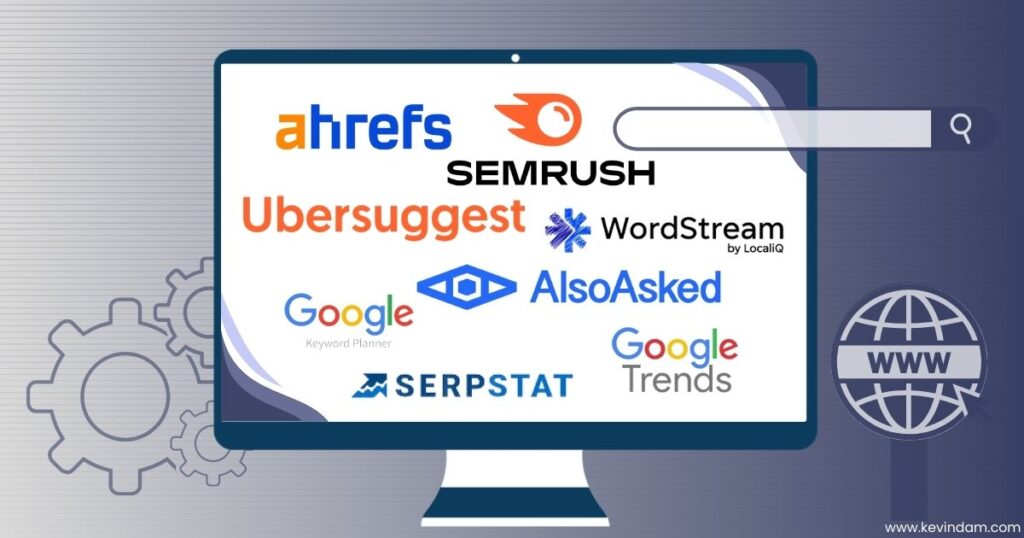
Keyword research is an indispensable component of any SEO content strategy. These tools help content creators and marketers discover phrases and questions that their target audience is searching for, as well as gain valuable insights into competition, search traffic, and trends. With the right keyword research tool, crafting a content brief that resonates with both search engines and users becomes significantly easier.
The following tools are industry-leading solutions that provide deep analytical capabilities and help enhance the content score, ensuring the creation of high-quality content which is tailored to achieve good search engine rankings.
Google Keyword Planner
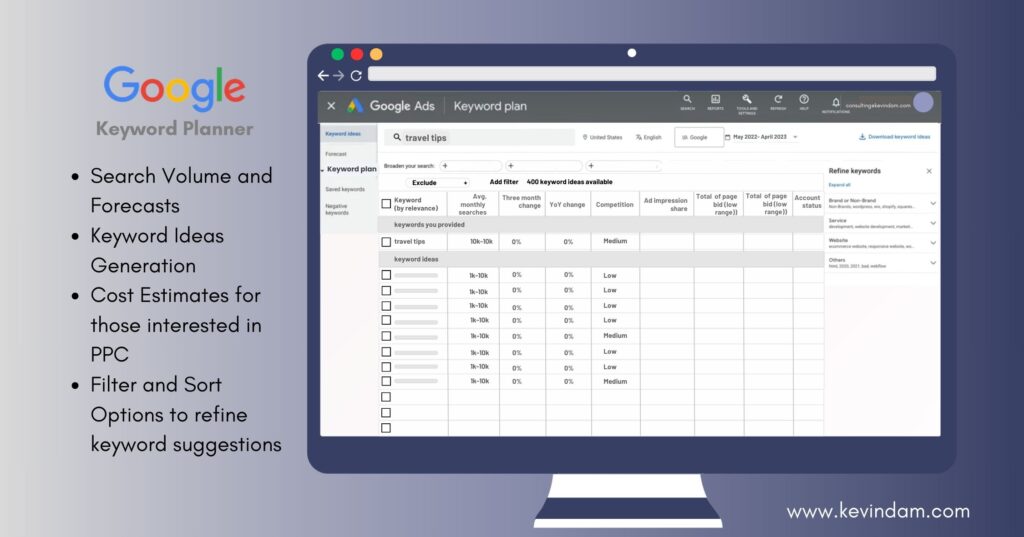
Google Keyword Planner is a free tool offered by Google Ads and is primarily used for ad campaign planning, yet it also serves as a potent resource for SEO keyword research. It helps users identify target keywords, giving insights into search volumes, trends, and competition levels. Features of Google Keyword Planner include:
- Search Volume and Forecasts: Users can see historical metrics and predictions on future searches for their target keywords.
- Keyword Ideas Generation: It offers suggestions based on seed keywords, which can help expand the keyword list with relevant phrases.
- Cost Estimates: For those also interested in PPC, the tool provides average CPC bids, although this can also indicate the competitive level of a keyword for SEO.
- Filter and Sort Options: Users can refine keyword suggestions based on several criteria, such as location, language, and negative keywords.
To use Google Keyword Planner effectively, signing in to a Google Ads account is necessary. Once logged in, users can navigate to the “Tools & Settings” menu to find and utilise the Keyword Planner feature.
While the interface is quite straightforward, screenshots can be particularly helpful for beginners to understand how to enter seed keywords and interpret results effectively.
SEMrush
SEMrush is a robust digital marketing tool, and its keyword research feature is one of the most comprehensive in the industry, catering to all aspects of SEO and PPC. Its features include:
- Keyword Overview: Gives a snapshot of a keyword’s monthly search volume, trend, keyword difficulty, and more.
- Keyword Magic Tool: Offers an extensive list of keyword suggestions and useful metrics such as volume, trend, keyword difficulty, and CPC.
- Organic Research: Allows users to see competitors’ keyword rankings, providing insights into potentially lucrative keywords.
- Keyword Difficulty Analysis: This shows how tough it would be to rank for a particular keyword.
SEMrush’s tools are presented in a user-friendly dashboard. Key information is displayed in both tables and graphical formats, making the data clear and easy to understand. Bullet points and screenshots can help highlight the most significant features of the tool.
Ahrefs
Ahrefs is a favourite among digital marketers and SEO professionals.
Its important features are:
- Keyword Explorer: Provides in-depth analysis of keyword metrics, including volume, click data, global volume, and keyword difficulty.
- SERP Overview: Analyzes the top-ranking pages for a keyword, showing critical data which can be used to craft competitive content strategies.
- Content Gap: This feature allows users to identify keyword opportunities that competitors might be ranking for, but they are not.
- Keyword Lists: Users can create and manage lists of keywords, which is helpful for organising SEO campaigns.
Ahrefs is user-friendly, and it promptly updates to reflect the latest data, ensuring that the information is always relevant. Screenshots can demonstrate the utility of features like the Keyword Explorer and SERP Overview, which are essential for creating content that stands out.
Analysing Competitor’s Content for Insights
To gain a competitive edge in SEO, it is essential to understand not only your content but also that of your competitors. By analysing the type of content they’re producing, you can identify what resonates with your target audience, discern gaps in your own content strategy, and uncover techniques they’re using to rank higher on search engine results pages (SERPs).
Importance of Competitor Analysis in Content Optimization
Competitor analysis is not just about keeping up with other players in the field; it’s a proactive step toward improving your content strategy. Here are several key reasons why competitor analysis is vital:
- Pinpointing Strengths and Weaknesses: By evaluating your competitors’ content, you can identify what they do well and where they may fall short, providing opportunities for you to excel.
- Identifying Keyword Opportunities: Discover keywords that are driving organic traffic to their site, which you might not have considered.
- Content Gap Analysis: Find topics that they haven’t covered or haven’t covered well, and create content to fill those gaps.
- Inspiring New Content Ideas: Competitor content can spark ideas for blog posts, guides, videos, and other types of content.
- Benchmarking for Content Quality: Measure your content against competitors to ensure you maintain or exceed the standard of quality that users expect.
Tools for Competitor Analysis
Several tools can assist in the meticulous task of competitor analysis, each offering unique features and functions:
| Tool | Description/Features | Function |
| Ahrefs | Powerful competitor analysis tool with features like the Content Gap and Link Intersect | Keyword comparisons with competitorsIdentifies backlinks to competitor pagesOffers ranking statistics, traffic insights, and industry keywords |
| Semrush | Renowned for keyword research & competitive intelligence | Analyses competitor keyword rankingsEstimates organic and paid trafficInvestigate backlinks, ad campaigns, and social media presenceProvides actionable SEO tips, real-time content auditing, tone of voice suggestions, readability review, onboarding materials and tips and tricks for optimising content for SEO. |
| SpyFu | Help you uncover opportunities to outperform your competitors in search engine rankings. | Reveals competitor keyword rankings and ad campaignsAnalyses backlink profilesOffers features for keyword research, grouping, and domain comparison |
| Moz Pro | Comprehensive SEO tool with competitor analysis features | Analyses competitor websites through site auditsConducts keyword research and backlink analysisTracks keyword rankings Identifies areas for SEO improvement |
| Majestic | Powerful backlink analysis tool | Analyses competitor backlink profiles Identifies opportunities for link-building strategy improvementOffers features for backlink analysis, anchor text analysis, and link-building opportunities |
By analysing their backlink profiles, you can identify high-quality websites to target for link building and improve your own website’s search engine rankings.
Improving Content Quality with AI Tools
Artificial Intelligence (AI) has revolutionised how we approach content creation and SEO. By leveraging advanced algorithms and machine learning, AI tools can enhance various aspects of content quality, such as readability, relevancy, and user engagement. Here’s how AI helps in improving content quality:
- Analysing User Intent: AI tools are capable of understanding and predicting user intent, allowing you to craft content that aligns more closely with what your audience is seeking.
- Readability Enhancements: They evaluate the readability of your content and provide recommendations to make it accessible and engaging for a broader audience.
- Content Personalization: AI can also personalise content for different segments of your audience, improving user experience and increasing dwell time on your site.
By utilising AI tools for content optimisation, you’re not only elevating the reader’s experience but also enhancing the overall SEO-friendliness of your content.
Importance of Content Quality in SEO
The quality of content is a cornerstone of successful SEO for several reasons:
- Engagement and Dwell Time: Quality content captivates the reader, increases dwell time, and reduces bounce rates, indicating to search engines that your content is valuable.
- Authoritative Signals: High-quality, informative content establishes your website as an authoritative source, which search engines reward with better rankings.
- Organic Sharing and Link Building: Exceptional content encourages organic sharing and natural link building, both of which are critical SEO elements.
Content that excels in quality is, therefore, essential for achieving high search engine rankings and resonating with your audience.
AI-powered Tools for Content Optimization

Including Artificial Intelligence in content optimisation is a smart strategy for SEO success. AI-powered tools are emerging as powerful allies, offering features that go beyond basic SEO optimisation.
Here’s why you should consider AI tools for content optimisation and AI writing assistance:
- They can help you analyse your target keywords and competitor content and suggest relevant topics and outlines. This sets the stage for the AI writing assistant to craft compelling drafts you can refine, saving you hours of research and brainstorming.
- These AI tools don’t stop at content generation. They analyse your existing drafts or suggest edits to optimise for search engines. This includes identifying opportunities to integrate your target keywords naturally and ensuring your content structure aligns with SEO best practices.
- Beat writer’s block with AI writing assistants that can generate introductory paragraphs, product descriptions, social media captions, and more, all based on your chosen keywords and desired tone.
Surfer SEO
Surfer SEO stands out as a potent content optimisation tool that enhances the quality and search engine rankings of your digital content. It helps identify the most relevant keywords and suggests the optimal density to avoid keyword stuffing, contributing to a natural piece of content. It generates comprehensive content briefs, guiding writers to craft high-quality content that resonates with target audiences and search engines.
Key Features of SurferSEO:
- Keyword Research Tools: Quickly find target and relevant keywords for your SEO strategies.
- Content Score: Evaluate your content against top Google SERP competitors to suggest improvements.
- Readability Score: Assesses and offers advice to improve the readability of your content.
- Content Editor: Provides real-time SEO suggestions while you write in Google Docs or other platforms.
- Internal Linking Suggestions: Recommends strategic internal links to bolster your content strategy.
SurferSEO’s analytical tools deliver valuable insights that drive organic traffic, steer clear of common pitfalls like passive voice misuse, and ensure a well-structured piece of content. Its pricing plans cater to diverse needs, making SurferSEO a versatile choice for SEO content optimisation. By emphasising content quality with actionable metrics, it helps content marketers maintain a competitive edge in search engine optimisation.
Frase.io
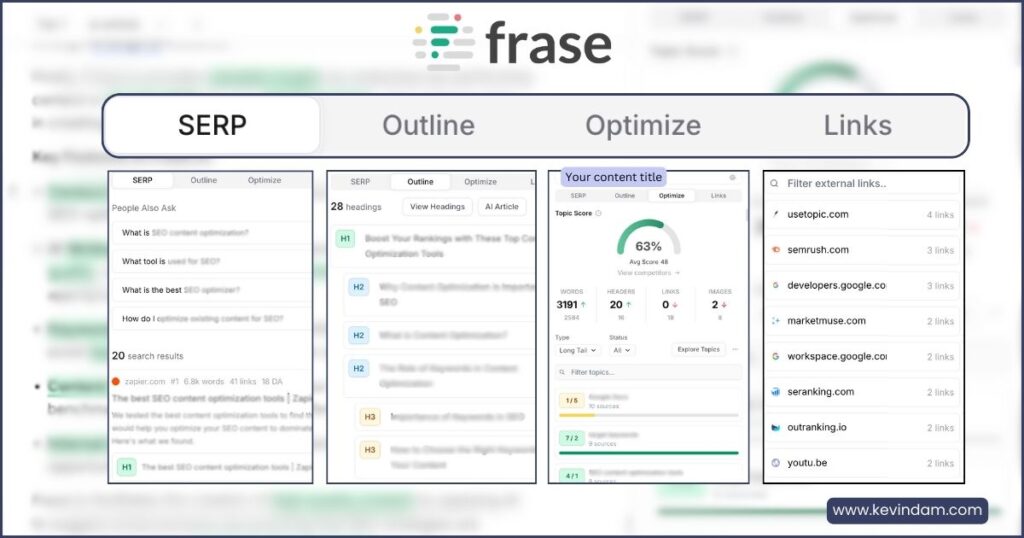
Content Optimization is a key aspect of SEO that focuses on making content more appealing to search engines and users alike. Frase.io is an SEO content optimisation tool designed to enhance this process through a range of features.
Firstly, Frase.io provides valuable insights by analysing top-performing content in Google SERP for your target keywords. This analysis helps in creating content that is both SEO-friendly and user-relevant.
Key Features of Frase.io:
- Content Briefs: Automatically generates guides that help you create SEO-optimized content outlines.
- AI Writing Assistant: Offers suggestions for improving content quality, such as addressing passive voice and achieving an appropriate readability score.
- Keyword Research Tools: Helps identify relevant keywords and avoid keyword stuffing, maintaining an optimal keyword density.
- Content Score: Assigns a score to your piece of content, benchmarking it against competitors for the same search terms.
- Internal Links Suggestions: Recommends strategic internal linking opportunities to enhance SEO.
Frase.io facilitates the creation of high-quality content by applying AI to suggest enhancements and ensuring that SEO strategies are aligned with the latest search engine optimisation practices.
Jasper
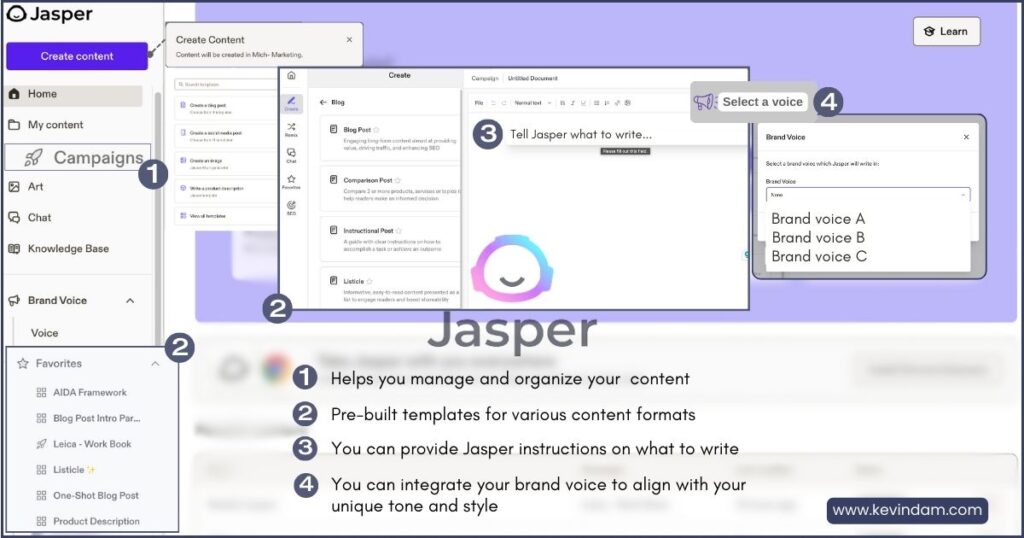
Built to augment content quality, Jasper aids in identifying target keywords and relevant keywords, streamlining the organic inclusion of these crucial elements within the piece of content.
Features like keyword research tools and content score assessments provide valuable insights into SEO practices. This allows for a seamless blend of high-quality content with the adept use of keywords, avoiding pitfalls like keyword stuffing.
What makes Jasper distinct is its ability to generate content briefs quickly, offering a foundation for writers to craft relevant content designed to boost organic traffic.
Its user interface promotes ease of use, with tools to check readability scores, suggest internal links, and ensure a balanced keyword density. As such, Jasper has become an essential component in effective SEO strategies, helping marketers avoid passive voice and formulate sound content marketing plans.
Here’s a quick rundown of Jasper’s features that aid in content optimisation:
- AI-driven content creation
- Keyword research and optimisation
- Content quality analysis with scoring
- Readability improvements and suggestions
- Internal links identification
- SEO strategy guidance
- Content brief generation
These capabilities make Jasper an invaluable resource for businesses looking to maximise their online visibility and improve their Google SERP positioning.
Conducting Content Trials to Improve SEO Performance
Trials in content creation allow for experimental tweaking and refinement of SEO strategies. Here’s how to execute them:
- Split Testing: Introduce variations of content to see which performs better in search rankings.
- Monitoring Results: Use tools to track the performance of your trials, such as organic traffic, click-through rates, and dwell time.
- Data-Driven Adjustments: Base your content refinements on analytical insights rather than guesswork.
- Content Iteration: Adapt the pieces of content that receive higher engagement and search visibility to inform future content creation.
- Feedback Loop: Create a system for soliciting and incorporating user feedback to continually enhance the content’s relevance and appeal.
- SEO Refinement: Tweak on-page elements like meta descriptions, internal links, and keyword placement based on trial outcomes.
By meticulously crafting content plans and conducting strategic trials, you place your content on a trajectory of continuous improvement and SEO dominance.
Conclusion
Leveraging the right tools and strategies is key to successful content optimisation. From conducting thorough keyword research and competitive analysis to utilising AI writing assistants and optimising tools to running strategic content trials – a multi-pronged approach allows you to fine-tune your efforts.
As search algorithms continue to evolve, emphasising content quality, user intent, and overall experience will remain important. Content optimisation is about striking the right balance between catering to search engines and delivering value to your audience. With a data-driven, user-centric mindset and the smart application of optimisation tools, you can create content that not only ranks well but truly resonates with your target audience.
